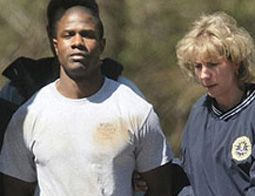Related articles:
Jury finds Ga. courthouse gunman guilty
Jury debates guilt of Atlanta courthouse shooter
Ga. courthouse shooting trial opens
The lessons of Atlanta: Former cop’s letter warned of lax security two years before murderous courthouse rampage
Ga. sheriff releases some of report on deadly courthouse rampage
 Brian Nichols, left, went on an shooting spree in 2005, killing a judge, court reporter and sheriff’s deputy at the Fulton County Courthouse, and a federal agent later that day. (AP Photo/John Spink) |
By Greg Bluestein
Associated Press
ATLANTA — After more than three years and a tangled trail of frustrating legal delays, the man who killed four people in a brazen courthouse escape was sentenced Saturday to prison for life without parole and hundreds of years more.
Yet prosecutors who spent the last month urging jurors to sentence one of Atlanta’s most notorious criminals to death were not celebrating.
“The community has spoken,” Fulton County District Attorney Paul Howard said at an emotional press conference after the sentencing of Brian Nichols. “Even though we are puzzled and terribly disappointed by the decision, we must accept the conclusion provided by our community.”
It showed how difficult it is to get a capital sentence in Atlanta’s Fulton County, where death penalties are rare even in a state where support for capital punishment is widespread. Georgia tied for third in carrying out executions last year.
And it underscored the problems Georgia prosecutors say they frequently face with the requirement that death sentences can only be returned by unanimous jury verdicts.
Nichols, 37, was found guilty last month of murdering a judge, a court reporter, a sheriff’s deputy and a federal agent in the March 2005 rampage.
After four days deliberating on whether to recommend the death penalty, the jury deadlocked at 9-3. Nichols will likely die in prison after Superior Court Judge James Bodiford handed down the maximum prison sentence on each of 54 charges.
The deadlock devastated prosecutors, who had turned down an offer from Nichols’ attorneys to plead guilty in exchange for a life sentence. The trial has already cost more than $2 million, likely the most expensive in state history.
And it may not be over yet: Howard said he’s talked to the U.S. Attorney about a federal death penalty trial for the federal agent’s slaying.
In the meantime, Howard and some state legislative leaders said Georgia’s death penalty rules should be changed.
“Georgia is a conservative state, but there are pockets where it is not,” said state Rep. Barry Fleming, a Republican who led a failed bid last year to allow judges to approve death penalties even if one or two jurors voted against it. “There are people who will attempt to nullify the law when they get on the jury.”
The last time a Fulton County jury issued a death sentence was eight years ago, and only then for a triple murderer who killed a toddler. One factor could be race. The county is 43 percent black, and numerous polls and surveys have found that blacks are more likely than whites to oppose capital punishment.
Eight of the jurors were black. The three who voted against the death penalty would not comment, but Howard said other jurors told him the three holdouts refused to deliberate. He said he was told that one was wearing headphones during the closed-door discussions this week.
Two jurors who spoke at Howard’s news conference but declined to be identified said they worked hard to try to reach a verdict.
“I believe Brian Nichols did not win. In his own words, he said it’s not his DNA to stay in jail, which is what he has to look forward to the rest of his life,” said Christina Greenway, daughter of slain court reporter Julie Ann Brandau. “I’m not disappointed and I have no regrets.”
Nichols was being escorted to his trial for rape when he overpowered a deputy guarding him and stole her gun. He burst into the courtroom and shot and killed Superior Court Judge Rowland Barnes, Brandau and sheriff’s Deputy Hoyt Teasley.
He fled downtown Atlanta and managed to evade hundreds of police officers searching for him overnight. In Atlanta’s posh Buckhead neighborhood, he shot and killed federal agent David Wilhelm at a house the agent was renovating.
Nichols was captured the next day in suburban Gwinnett County after a woman he took hostage, Ashley Smith Robinson, alerted police to his whereabouts. Smith Robinson was credited with bringing a peaceful ending to the rampage by appealing to Nichols’ religious beliefs and giving him illegal drugs.
Death penalty experts said the Nichols verdict shows there’s no telling what will happen when a jury is asked to settle a capital case.
“It’s very hard for 12 people to sit down around the table to make a decision to put another human being to death,” said Stephen Bright, a Yale Law School lecturer and a veteran capital defense attorney.
Nichols, who argued he was insane when he carried out the killings, spoke for the first time in court on Saturday as relatives of the victims’ families quietly wept.
“I just wanted to say that I know that the things I’ve done caused a lot of pain and I’m sorry,” he said. “And I just wanted to say that I will not bring dishonor to the decision to spare my life. That’s it.”
The judge had advice for anyone who deals with Nichols in the future: “Do not trust Mr. Nichols ever again. Ever again. Because he cannot be trusted.”

